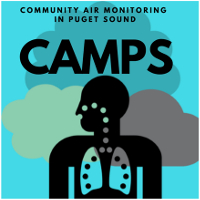Go to: Project goals Project collaborators Project outcomes Project updates Contact us Media and resources
Project goals

The goal of this project is to expand and enhance the exposure assessment activities of the parent study by complementing the efforts of academic research with community-based participatory research (CBPR).
This two-year project, funded by the National Institute of Environmental Health Sciences (NIEHS), has the primary objective of understanding the air pollution health risks faced by communities in South Seattle. South Seattle is found between two major freeways and contains many busy roadways. Residents in these communities may be exposed to air pollution from a variety of sources due to busy highways, roadways, construction and nearby industrial companies. Regulatory air monitors are located in the neighborhood of Beacon Hill, South Park, and Duwamish River.
We will be using low-cost air monitors in Seattle to measure air pollution at a neighborhood level. The information collected will be used to identify trends in the air pollution to determine peak days peak times of day, and average air pollution level. The information will be used to determine the sources of the pollution and develop strategies to aid in the reduction of air pollution exposure in the community.
Project collaborators
Our goal is to collect neighborhood-level air pollution data by partnering with child care organizations. Community partners will inform the main goals and objectives of this study. The community will collaborate with scientists in selecting the location of 10 monitoring sites. Community partners will be key in disseminating results of the study, identifying mitigation strategies and leading future efforts to reduce air pollution impact in the Seattle area.
Scientists from the University of Washington will provide both equipment and technical guidance to maximize the quality of data collected. The location of the monitors and analysis methods will be selected to best address the concerns raised by community partners. The scientists will oversee data collection and analysis.
Project outcomes
Project results will be shared with community partners on an ongoing basis through meetings and a dedicated website. We expect that our results will increase community understanding of geographic differences related to traffic pollutants, origins of pollutants and potential hazards to the community. Additionally, we hope to increase community knowledge and empowerment and provide guidance on future solutions.
Project updates
OCTOBER 2018
As of October 2018, a real-time visualization of our low-cost air monitoring data has been launched. Please visit our our dashboard to view your neighborhood level air pollutant data, and find tips to reduce your exposure to air pollutants. You can also report air events, such as local fires, smoke, smells, etc. at our new dashboard. Click here!
AUGUST 2018
If you are interested in joining our study as a community steering committee member please contact Nancy Carmona Download the flyer
If you are interested in joining our study as a community partner and/or hosting a community air monitor, please contact Nancy Carmona or complete this survey
JULY 2018
Our community survey on air pollution was completed by a total of 180 Puget Sound residents. Thank you for your input! A summary of our findings will be uploaded Autumn 2018.
JANUARY 2018
Join us at our community meeting on January 30 at Columbia City Library, 6:00pm - 7:30pm Download the flyer
If you are unable to attend but would like to participate please complete our community survey on air pollution.
Join us at our community meeting on January 23 at Greenwood Library, 6:30pm - 7:30pm Download the flyer
Contact us
Lianne Sheppard, PhD
Principal Investigator of ACT-AP
University of Washington
206-616-2722
sheppard@uw.edu
Vanessa Galaviz, PhD
Community Research Advisor
University of Washington
vanesg@uw.edu
Nancy Carmona, MPH
Principal Investigator of CAMPS / Graduate Student Researcher
University of Washington
916-470-1805
nancyc9@uw.edu
Media and resources
 Follow us on Twitter! @SSairstudy
Follow us on Twitter! @SSairstudy